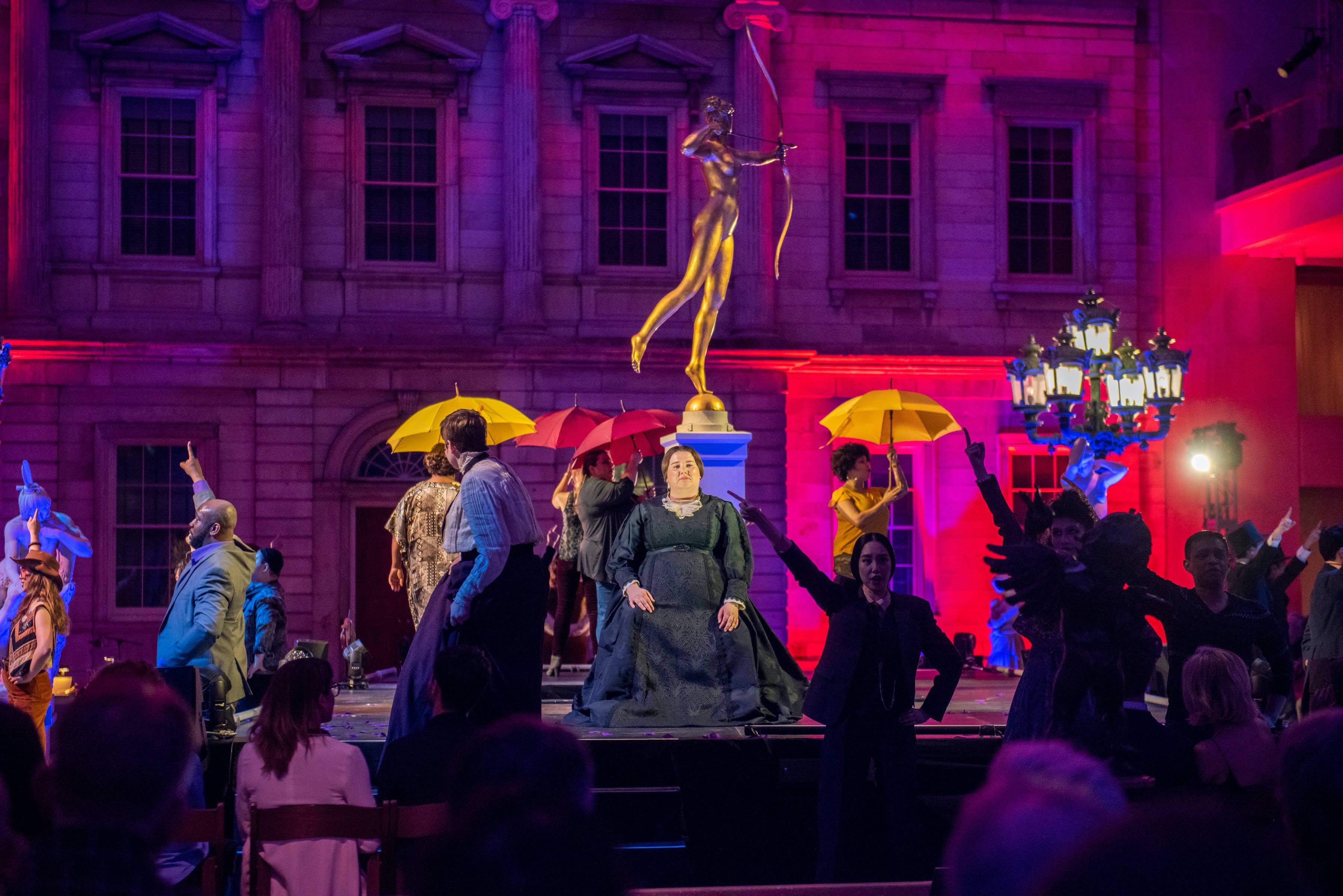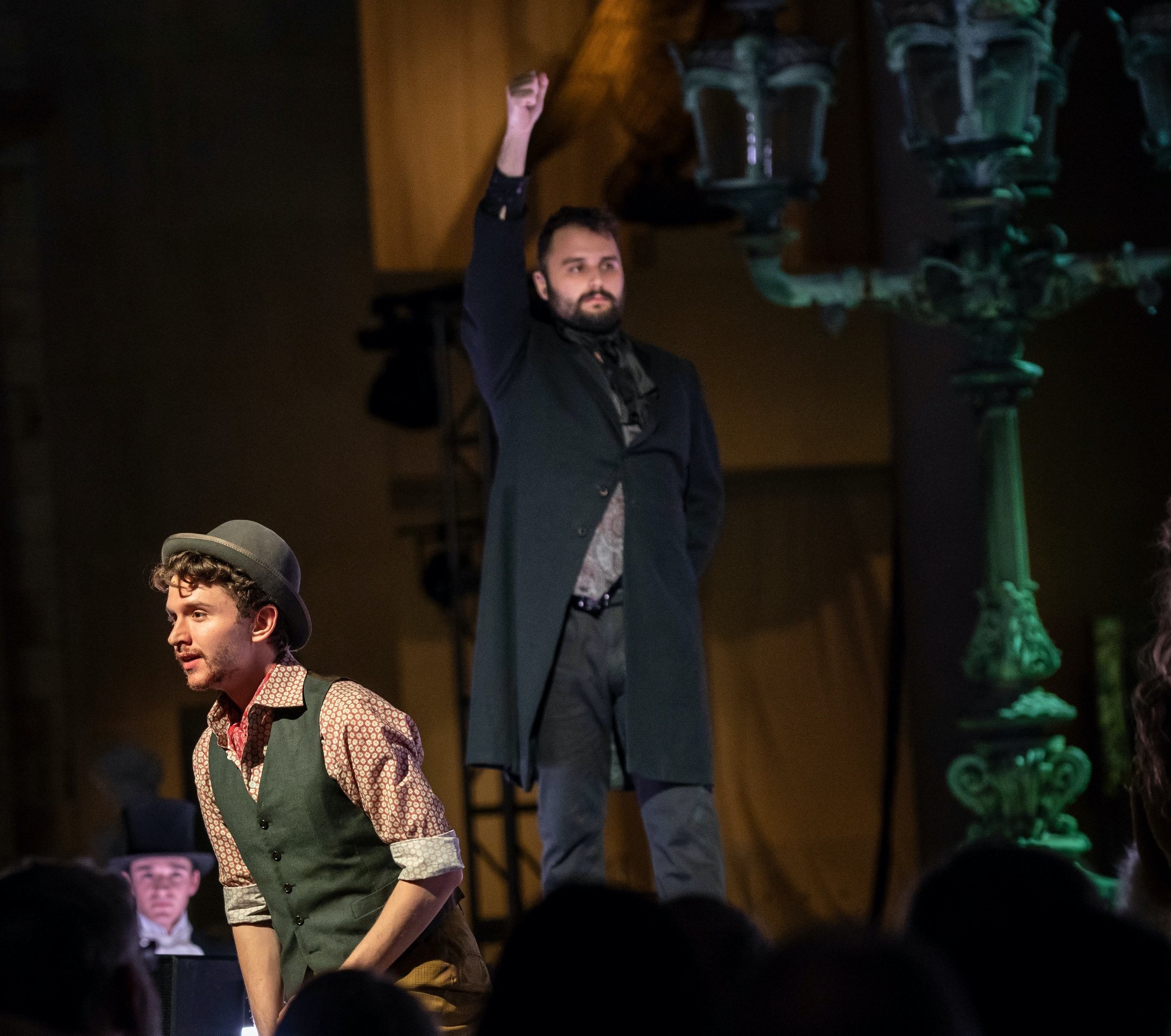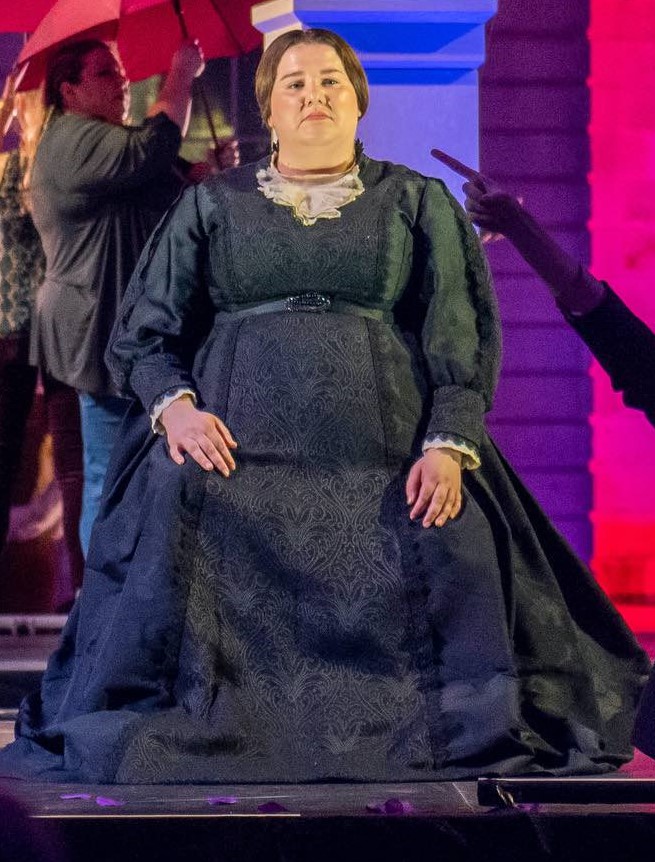Reviews
Susan B. Anthony Is (Still) The Mother of Us All
Forget Beethoven’s 250th birthday, this year’s most inspirational anniversary is the centenary of the passing of the Nineteenth Amendment (“The right of citizens of the United States to vote shall not be denied or abridged by the United States or by any State on account of sex”). No American did more to further the cause of women’s suffrage than Susan B. Anthony, and this celebratory staging at The Metropolitan Museum, viewed at its February 8 opening, of Virgil Thomson and Gertrude Stein’s approbatory opera The Mother Of Us All is a timely reminder of a life well lived.
 Felicia Mooore (center) and cast in The Mother of Us All at the Met Museum's American Wing
Felicia Mooore (center) and cast in The Mother of Us All at the Met Museum's American Wing
Premiered in 1947, it was Thomson’s second opera and a finer work than 1928’s musically chipper but textually impenetrable Four Saints in Three Acts or the dated hyper-romance of 1968’s Lord Byron. Combining historical figures such as Anthony herself, Daniel Webster, and John Adams (presumably John Quincy Adams) with fictional archetypes like Chris the Citizen, Jo the Loiterer, and the prototype woman-of-the-future Indiana Elliot, the opera uses debate, reflection, and occasional incident to explore themes of progress, enfranchisement, and gender-politics in a way that is both playful and informative without ever seeming preachy.
A humorous debate as to whether Indiana Elliot should take her new husband Jo the Loiterer’s name allows Stein to examine male fears that giving women the the vote would undermine the estate of marriage. She also touches on African American voting rights, and even hints at a gay relationship between Anthony and her fictional companion Anne. Another piece of fiction, central to the opera, is that Anthony’s oratory led tremulous politicians to insert the word “male” into the Constitution in order to make it impossible for women to vote. (The fact is, it was always there.)
 Part of the inventive MetLiveArts program, Louisa Proske’s bravura staging features a simple but effective scenic design by Sara Brown, an appealing mix of period and contemporary costuming by Beth Goldenberg, and a functional lighting design by Barbara Samuels. But the stroke of genius is the site-specific setting in The Charles Engelhard Court, part of the Met’s iconic American Wing. With the towering 1831 Palladian facade of Wall Street’s United States Branch Bank as backdrop, and surrounded by the finest examples of 19th-century American statuary, the nation’s history is front and center. For an opera that ends with Anthony’s statue being unveiled at the U.S. Capitol, it couldn’t be a better fit.
Part of the inventive MetLiveArts program, Louisa Proske’s bravura staging features a simple but effective scenic design by Sara Brown, an appealing mix of period and contemporary costuming by Beth Goldenberg, and a functional lighting design by Barbara Samuels. But the stroke of genius is the site-specific setting in The Charles Engelhard Court, part of the Met’s iconic American Wing. With the towering 1831 Palladian facade of Wall Street’s United States Branch Bank as backdrop, and surrounded by the finest examples of 19th-century American statuary, the nation’s history is front and center. For an opera that ends with Anthony’s statue being unveiled at the U.S. Capitol, it couldn’t be a better fit.
There are hurdles. The vast, echoing space is an acoustical challenge, and although the six New York Philharmonic musicians are amplified and the singers use radio mics, the mix is often to the detriment of Thomson’s scintillating score. The voices and Stein’s all-important text come across loud and clear (surtitles help), and fortunately the ear quickly adjusts, but hearing the singers’ voices out of speakers makes it sometimes difficult to locate them visually in the space.
On the other hand, Kit Fitzgerald’s video design is a huge plus, the 50-foot images of American women marching for the vote projected onto the Wall Street bank at the start is a rousing touch. Stein’s failure to identify some of her dramatis personae within the libretto is cleverly overcome by projecting onto the backdrop each character’s name, dates, and whether they are real or fictional.
Stein declined to describe where and when the various scenes take place, giving a director pretty much free rein. With audience seated on three sides, the cast is deployed around the hall to excellent effect ensuring that most of them can be seen most of the time.
 Proske makes some telling points, focusing the start of the show on Anthony’s feverish attempt to drop her vote into a bright red ballot box, a moment denied her by smirking Victorian gentlemen in black. Zoe Scofield’s choreography takes full advantage of the space with actors sometimes inches from the audience and the chorus hoofing it up on the steps of the bank.
Proske makes some telling points, focusing the start of the show on Anthony’s feverish attempt to drop her vote into a bright red ballot box, a moment denied her by smirking Victorian gentlemen in black. Zoe Scofield’s choreography takes full advantage of the space with actors sometimes inches from the audience and the chorus hoofing it up on the steps of the bank.
The youthful singers are drawn from The Juilliard School’s Institute for Vocal Arts, with Felicia Moore—the 2019 Birgit Nilsson Prize-winner at Operalia, and herself a recent Juilliard alumnus—the only professional in the cast as Anthony. Moore is commanding, her powerful soprano warmly burnished in the lower and middle registers and clarion at the top. In what is essentially an ensemble show, there are strong contributions from Gregory Feldmann as Virgil T. (he and Gertrude S. act as a sort of Greek chorus early on), and William Socolof as a pompous, funereal Daniel Webster. Most promising are tenors Chance Jonas-O’Toole and Ian Matthew Castro. Jonas-O’Toole’s agile vocals and detailed dramatic performance make a most sympathetic Jo the Loiterer (like women, 19th-century “loiterers” were disenfranchised), while Castro makes a convincingly ardent lover of John Adams, singing with rich, powerful tone and a mature elegance.
Conductor Daniela Candillari keeps Thomson’s heady blend of hokey hymns, marching tunes, and nursery rhymes ticking along. The official reduced orchestration includes prominent roles for trumpet, percussion, piano, and organ (doing duty as a harmonium), and the players here are first rate, even if the blend is often muddied by the acoustic.
Anthony may have died 14 years before the Nineteenth Amendment became law, but this production is a fitting tribute to a woman and role model whose whole life was a crusade. “We cannot retrace our steps,” she sings confidently at the end. In these troubling times, let’s hope she’s right.
The Mother of Us All runs through February 14. It is part of the New York Philharmonic’s Project 19 initiative and is a collaboration among the orchestra, the Metropolitan Museum’s MetLiveArts, and the Juilliard School.
Pictured: Chance Jonas-O’Toole and William Socolof as Jo the Loiterer and Daniel Webster; Felicia Moore as Susan B. Anthony.
Photos by Stephanie Berger





 FEATURED JOBS
FEATURED JOBS

 RENT A PHOTO
RENT A PHOTO


